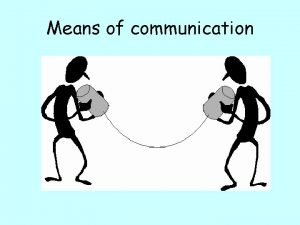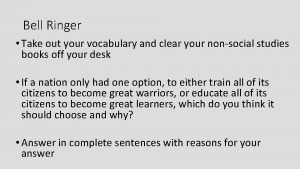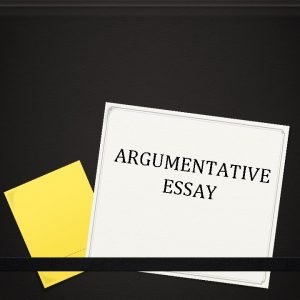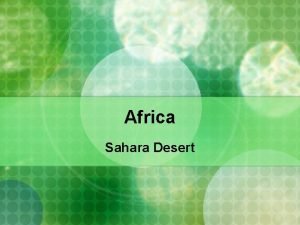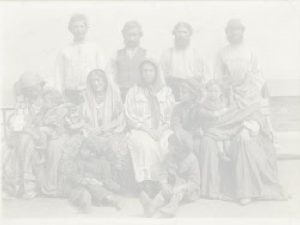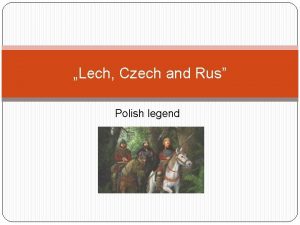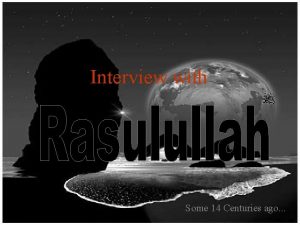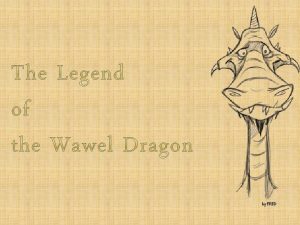Worldwide history of the future Three centuries ago







- Slides: 7

Worldwide history of the future Three centuries ago, most people eeked a living unless they were kings or high priests Then some people started designing systems – spun by energy-industrial revolution – to build up to 300 times more wealthy places to be alive and bring up children. Around 1972 a greater revolution opportunity – mashing up clean energy and digital’s potentially free education began. Its exponential impacts will be fast, for good or for evil, 2010 s maps as last decade youth can employ all the positives flows of collaboration

Economist’s Curriculum of Entrepreneurial Revolution ER 0. 1 Adam Smith rolling in his grave: Year 41 Terrifying Nobel Mistake: separate prizing of peace & economics This can explain urgent courses of 21 st C pro-youth economics and education come from: üSouth Africa and India since 1906 üJapan since world war 2 üBangladesh since 1972 üAnd hopefully China üKeynes 1930 s – Economists are those who design systemic futuresthey compound greatest risks on youth except when they map win-wins

Economist’s Curriculum of Entrepreneurial Revolution ER 0. 2 net generation valuation impact: 1984: www youth’s most productive time If and only if Click top 100 microfranchises mapped by youth/friends of The we start searching out 30000 Microfranchises NOW! Microfranchises invest in youth, mass collaboration Economist’s Entrepreneurial Revn. üOpen source life critical service formats across communities üThey celebrate the value multiplying dynamics of service teams and knowhow networkin -note knowledge multiplies value in use unlike scarcity economics of consuming things üDigital apps once coded can be mobilised anywhere that is linked in üEnjoying the greatest race to ending poverty: linkin poorest/disconnected communities

Economist’s Curriculum of Entrepreneurial Revolution ER 1. 1 Mathematical Maps of Innovation Clarify and minimise axioms, then explore where these lead in actionable contexts: üP*D Wherever conflicted – mediation by The Economist to compound maximising how peoples Productive lifetimes interact, not maximising Demand extraction üMicro. First: Diversity of communities/cultures provide early warning signs of planetwide sustainability crises; as far as possible only serve leaders who multiply trust not distrust üOpen. Futures: Society trusts measurement/legal professions monopolies of responsibility- but the greats of maths show that the peoples must sense ahead of time when top-down professions are no longer adminstering systemically safe/joyful rules

Click top 100 microfranchises mapped during 41 years of open search by youth/friends of The Economist’s Entrepreneurial Revolution http: //normanmacrae. ning. com/forum/topics/vote-for-top-100 -microfranchises-of-net-generation

Norman Macrae Foundation pro-youth economcs & education Norman. Macrae. ning. com

Economist’s Curriculum of Entrepreneurial Revolution ER 0. 2 net generation valuation impact: 1984: www youth’s most productive time If and only if Click top 100 microfranchises mapped by youth/friends of The we start searching out 30000 Microfranchises NOW! Microfranchises invest in youth, mass collaboration Economist’s Entrepreneurial Revn. üOpen source life critical service formats across communities üThey celebrate the value multiplying dynamics of service teams and knowhow networkin -note knowledge multiplies value in use unlike scarcity economics of consuming things üDigital apps once coded can be mobilised anywhere that is linked in üEnjoying the greatest race to ending poverty: linkin poorest/disconnected communities
